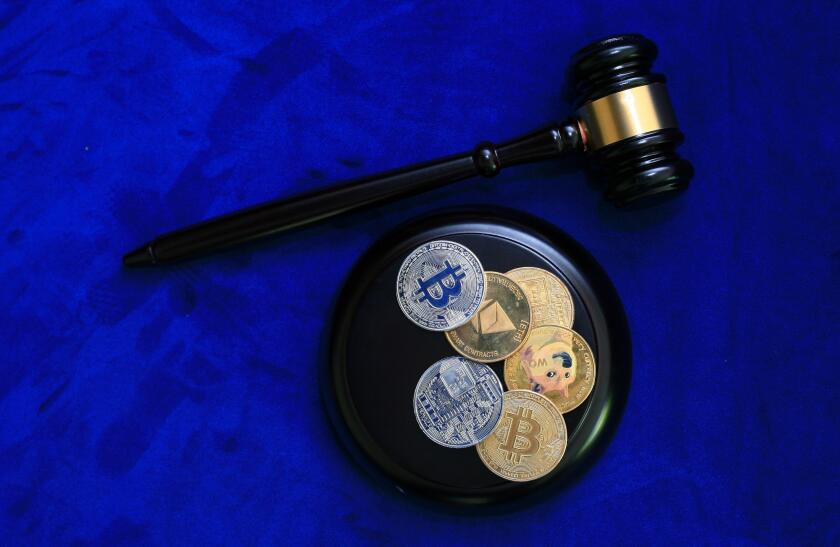The cryptocurrency landscape
Since the creation of Bitcoin in 2009, there has been a surge of investment in the cryptocurrency market, which has a current market capitalisation of $1.26 trillion. Given the scale and ubiquity of investment, cryptocurrency-related disputes have become a burgeoning area of interest for stakeholders, spurred by the ongoing ‘crypto winter’, which has heralded an influx of lawsuits and regulatory complaints in various cases around the world.
In anticipation of cryptocurrency litigation evolving to become a norm, this article looks at notable cases from Singapore and the UK and analyses some of the potential difficulties faced by stakeholders in actions where cryptocurrency is the subject of the dispute.
Cryptocurrency and litigation
Decentralised finance refers to a financial ecosystem or model that utilises public blockchain technology as a ledger to provide financial services, instead of relying on traditional financial institutions or central institutions. This means that cryptocurrency is not regulated by any external authority, making it a target for hacking and fraud. The nature of cryptocurrency thus inspires many novel legal questions, some of which are addressed below.
Jurisdiction
Where crypto assets are the subject of a dispute, the first question that should be addressed is where to commence legal proceedings. Given that crypto assets exist on a blockchain, can be moved at an instant and can be controlled from anywhere, determining the relevant jurisdiction may be difficult.
In the UK, the English courts have been willing to find jurisdiction based on the location of the stolen crypto assets.
In D’Aloia v (1) Persons Unknown (2) Binance Holdings Limited & Others [2022] EWHC 1723 (Ch), the claimant, who was domiciled in England, brought proceedings against persons unknown, a number of cryptocurrency exchanges and others, for the alleged fraudulent misappropriation of his crypto assets. The claimant applied to the English High Court for an interim freezing injunction to prevent the defendants from disposing of the crypto assets.
The court granted the interim freezing injunction, finding that there was a good arguable case that the English courts would be the appropriate forum because:
The misrepresentations were made in England;
The asset was located in England; and
The claim would likely be governed by English law because the damage was suffered in England when the asset was misappropriated from the claimant.
In Singapore, the courts have determined jurisdiction based on the claimant’s or the defendant’s connection with Singapore.
In Janesh s/o Rajkumar v Unknown Person (“CHEFPIERRE”) [2022] SGHC 264 (Chefpierre), notwithstanding that the domicile, residence and present location of the defendant was unknown, the Singapore High Court held that it had jurisdiction to hear the claimant’s application for a proprietary injunction (i.e., an order to prohibit the defendant from disposing of the crypto asset before the suit was heard).
While the court observed that the decentralised nature of blockchains could pose difficulties with regard to establishing jurisdiction, there had to be a court which had the jurisdiction to hear the dispute. As the claimant was located in Singapore and carried on business there, the Singapore court found that it had jurisdiction to hear the application.
Service of process, pseudonymity, and enforcement
A second issue arising from cryptocurrency litigation relates to the service of documents. Parties are usually obliged to serve originating process by dint of personal service. Where personal service of documents is unsuccessful, the court may order substituted service of the court documents, such as through post, advertisement, email, or social media. However, in fraud cases or cases involving theft of crypto assets, many of the culprits are located outside Singapore or operate from locations that are unknown. It is therefore challenging (or impossible) to serve court documents on the fraudsters.
To overcome this problem, the Singapore courts have adopted an innovative method of substituted service – service of court documents via social media and by messaging the defendant’s cryptocurrency wallet address.
In Chefpierre, the Singapore High Court granted a freezing injunction against the defendant, who was an ‘unknown person’, to prevent him from disposing of a non-fungible token (NFT) which had been transferred from escrow into his cryptocurrency wallet. When granting the prayer for substituted service out of jurisdiction, the court noted that the methods of service prescribed in the Rules of Court 2021 comprised a non-exhaustive list, and “to find otherwise would be to deprive the claimant of the only practical manner of effecting service on the defendant.”
Although this case illustrates the willingness of the Singapore courts to adapt to the unique circumstances in cases of cryptocurrency fraud, it remains to be seen if such orders, once obtained, result in only pyrrhic victories. Even though an injunction is capable of being granted and served on ‘persons unknown’, service is only one of several hurdles that potential claimants face in their journey to seeking recovery.
In this regard, the case of Joseph Keen Shing Law v Persons Unknown & Huobi Global Limited (unreported, January 26 2023) provides a potential solution. Here, the English High Court made an order for the Huobi crypto exchange to convert the crypto assets from accounts maintained offshore into fiat currency, which would then be transferred into England and Wales, to facilitate the enforcement of its judgment.
When making its order, the court acknowledged the importance of the fact that Huobi was cooperating with the claimant and the court by freezing the perpetrators’ accounts. Given that cryptocurrencies operate on decentralised networks, it is ordinarily difficult for courts to exercise direct control over these assets. In this context, the cooperation of crypto exchanges becomes pivotal in helping to deter potential fraudsters and enhancing the overall legitimacy and trustworthiness of the cryptocurrency ecosystem. The introduction of a regime allowing the courts to compel such cooperation presents a practical solution to an otherwise problematic issue for cryptocurrency litigants.
Cryptocurrency and the legal concept of property
There has been some debate as to what type of property cryptocurrency and other crypto assets should be categorised under. The Court of Appeal in Quoine Pte Ltd v B2C2 Ltd [2020] SGCA(I) 02 chose to leave this question open. In CLM v CLN and others [2022] SGHC 46, the Singapore High Court referred to the analysis of the New Zealand High Court in Ruscoe v Cryptopia Ltd (in liq) [2020] 2 NZLR 728, wherein the court applied the four Ainsworth criteria and found that cryptocurrencies could give rise to a property right. Similarly, in the later decision of Chefpierre, the Singapore High Court applied the Ainsworth criteria and found that NFTs do give rise to property rights that are capable of being protected by an injunction.
However, in the recent decision of ByBit Fintech Ltd v Ho Kai Xin and others [2023] SGHC 199, the tension caused by categorising cryptocurrency as choses in action was thrown into stark relief. In this case, the court was asked to decide whether the crypto assets in question (i.e., Tether) are property capable of being held on trust. Acknowledging the incorporeal character of cryptocurrency, the Honourable Justice Philip Jeyaretnam observed (at [35] to [36]) that:
“[There is a] diversity of incorporeal property that has been classed as things in action. This diversity suggests that the category of things in action is broad, flexible, and not closed… My conclusion is therefore that the holder of a crypto asset has in principle an incorporeal right of property recognisable by the common law as a thing in action and so enforceable in court. While it might be said that this conclusion has an element of circularity in that it could also be said that the right to enforce in court is what makes it a thing in action, this type of reasoning is not strikingly different from how the law approaches other social constructs, such as money. It is only because people generally accept the exchange value of shells or beads or differently printed paper notes that they become currency. Money is accepted by virtue of a collective act of mutual faith.”
This contrasts with the approach taken in the UK, where the English High Court in AA v Persons Unknown [2019] EWHC 3556 (Comm) observed at [58]–[59] that:
“The English law of property recognises no forms of property other than choses in possession and choses in action [and] crypto currencies do not sit neatly within either category… but that does not mean that it cannot be treated as property.”
To resolve the debate over whether digital assets can be property, the Law Commission of England and Wales published its Digital assets: Final report on June 28 2023, which included recommendations to recognise a new “third category of thing” which personal property rights can relate, but which are not things in action or in possession.
A digital asset will be considered a third category thing if:
It is composed of data represented in an electronic medium;
It exists independently of people and the legal system; and
It is rivalrous, which essentially means that the holding of the thing by one person necessarily prevents another from holding the same thing at the same time.
This proposed category would have no hard boundaries and allow the English common law to develop alongside technological advancements.
Whichever the approach and categorisation, these legal developments demonstrate the willingness of the courts to acknowledge the existence of property rights in crypto-related disputes, which is undoubtedly welcomed by stakeholders within the industry.
Cryptocurrency not recognised as money
Where the Singapore courts seem to have drawn the line is in recognising cryptocurrency as money. In Algorand Foundation Ltd. v Three Arrows Capital Pte. Ltd. (HC/CWU 246/2022), Algorand Foundation filed a winding-up application in the Singapore High Court to wind up Three Arrows Capital based on a cryptocurrency claim of 53.5 million USD Coin. The issue before the court was whether Algorand’s claim could be considered a debt in money, which would in turn determine whether Algorand was therefore a creditor entitled to proceed with the winding-up application.
Although the High Court found that while a party who owes a sum denominated in cryptocurrency is a “creditor” under Section 124(1)(c) of the Insolvency, Restructuring and Dissolution Act 2018, it held that a debt denominated in cryptocurrency does not constitute a money debt for the purposes of a winding-up application, and dismissed the winding-up application.
In coming to its decision, the High Court gave particular weight to the intangibility of cryptocurrency and observed that “the word indebtedness... must require a debt which is in fiat currency”, and cryptocurrency was not money for such purposes.
Final thoughts
The upswing in cryptocurrency investment has brought about a host of complex legal challenges. As explored in this article, the decentralised nature of cryptocurrencies, coupled with their incorporeality, presents unique legal obstacles that have required adaptation by the courts and regulatory bodies worldwide.
Navigating this emerging landscape requires a comprehensive understanding of traditional legal principles and the intricacies of blockchain technology. As courts are increasingly tasked with reconciling existing laws with the novel complexities of cryptocurrency transactions, legal professionals will inevitably have a hand in shaping the body of law relating to cryptocurrency transactions and assets.



